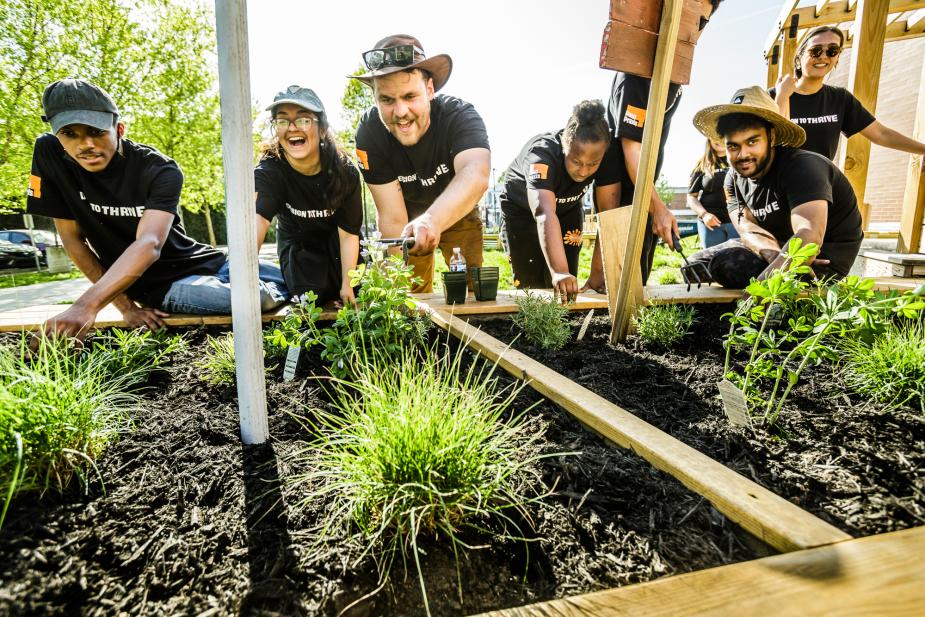
Netter Center
Guided by Benjamin Franklin’s founding vision for the university to develop among all Penn students “an Inclination joined with an Ability to serve,” Penn’s Netter Center for Community Partnerships supports programming and course work that gives Penn students opportunities to integrate learning and service.
At the heart of the Netter Center’s activities are the 200+ Academically Based Community Service (ABCS) courses through which Penn students earn academic credit while engaging in research, teaching, and problem-solving with the community. More than 80 ABCS courses are offered throughout the curriculum each year. Many new courses have been created thanks to inspiration from students who recognize problems and want to find solutions.
The Center partners with local schools and other community-based organizations to generate knowledge of global significance, creating understanding of common issues and implementing innovative solutions. The work done by the Netter Center is mutually beneficial—improving the quality of life and learning both in the community and on campus.

Netter Center students work on a community garden.
Examples of ABCS Courses
In this intergenerational seminar, Penn students together with older community members read groundbreaking playwright August Wilson's American Century Cycle. American Century Cycle is ten plays that form an iconic picture of African American traditions, traumas, and triumphs through the decades, almost all told through the lens of Pittsburgh's Hill District neighborhood. The class plans and hosts events for a multigenerational, West Philadelphia-focused audience with community partners West Philadelphia Cultural Alliance/Paul Robeson House & Museum, and Theatre in the X. Class members come to a deeper understanding of Black life in Philadelphia through stories community members share in oral history interviews. These stories form the basis for an original performance the class creates, presented at an end-of-semester gathering.
In this course, Penn Students learn about the tax system as it relates to individuals and sole proprietors. They consider the effectiveness and usefulness of tax policies relative to other tools that the government has available. Additionally, Penn students learn to discuss sensitive financial issues with lower-income adults through readings, in-class discussions, and by reflecting on their real-life experiences in the local community. Penn students go through IRS’s “Volunteer Income Tax Assistance” (VITA) training, which covers general tax preparation, with a specific focus on tax credits available to VITA-eligible taxpayers and the use of VITA software. Following training, Penn students perform tax services for the West Philadelphia community during tax season.
This interdisciplinary course combines bicycle design, engineering, and service learning to provide Penn students with a comprehensive understanding of the history, evolution, and impact of bicycles on society and the environment. Through hands-on projects, community engagement, and class discussions, Penn students develop bicycle design and engineering skills, gain practical experience and exposure to bicycle repair and maintenance, explore the impact of bicycles and related technologies on society and the environment, and understand the role of bicycles in sustainable urban mobility and planning.
This course is an opportunity for Penn students to share their interest and enthusiasm for neuroscience with students in grades 9-12 attending urban, public schools in West Philadelphia. The course will allow Penn students to develop their science communication and teaching skills. Penn Students will prepare neuroscience demonstrations, hands-on activities, and assessment tools. In parallel, the course aims to engage local high school students, increase their interest and knowledge in science, and ultimately promote lifelong science literacy.
This course examines the complex matrix of factors that contribute to obesity from a scientific, cultural, psychological, and economic perspective, as well as established treatment options. Penn students learn about primary prevention by partnering with nutrition and fitness programs at university-assisted community schools in West Philadelphia. This includes supporting youth-driven edible school gardens, healthy food stands run by elementary school students and high school cooking crews, and recess and sports programs.
